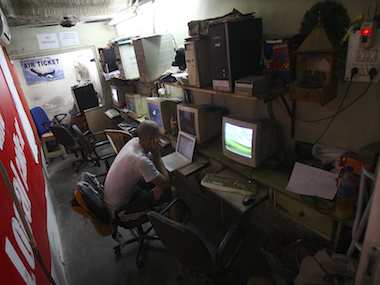Seemingly fond of talking about talk, Telecom Minister Kapil Sibal is at it again. His most recent problem with social media is not the message, but the people behind the message. Speaking to the media on Thursday Sibal said, “Though the reach of social media is large, the number who use it are limited. We are getting an elitist viewpoint.” In one way, Sibal is pointing out the obvious: not everyone has the money for a smart phone, tablet device or even a computer. They may be gradually becoming more affordable to a wider group of people, but we’re as far away from being universally wired as humanity is of being universally fed. [caption id=“attachment_157349” align=“alignright” width=“380” caption=“An internet cafe in central New Delhi, India. Ruth Fremson/The New York Times”]  [/caption] That isn’t so much a problem - technological access comes to people at different rates and speeds. But there are also people who are not on social media out of choice. Not because they’re excluded, which seems to be his implication. Sibal may believe that the voices accessing social media - ie the voices who say things he likes - may not be fully represented on Twitter and Facebook. That’s entirely possible. Are enough women or minorities using social media? Enough capitalists? Fascists? Communists? Libertarians? When Sibal talks elitism, he implies that the elite believe themselves to be better than Sibal or Gandhi or the government generally. People might well believe that, but it doesn’t make them elite. There is, certainly, a techno-geek/techno-chic form of elitism that believes you MUST be on social media and that there’s something wrong with you if you don’t. Certainly that’s the case in the media. I felt pressured to join Twitter because I was told it was the best way to cover the 2010 UK General Election results. It was useful but it doesn’t change the person behind the tweets. We have seen this year too how the cult of celebrity that elevated the late Steve Jobs to the level of a deity has a certain elitism about Apple technology. I might prefer Macs but I would never denounce anyone using something else. To judge yourself better than others based on the “stuff” you have is elitist and condescending. Sometimes tech is SO cool it’s impossible not to want to show it off. Pride and vanity about slick design is part of a modern and capitalist world. But Sibal isn’t really referring to these elements. He wanted to limit the message, and when there was a backlash, changed his own message to increasing the diversity of voices. One has to wonder whether, even with every one of India’s 1.2 billion people tweeting, if he would still complain should they not say what he considers to be the right things. Sibal also said he wants to “empower government” with social media. The best way to combat elitism isn’t by changing the messages coming from social media, which is largely impossible anyway, short of complete government censorship. The more people exercising their right to free speech, the less elite that speech becomes. But the choice to speak is facilitated through education in language, in forms of expressions (words, art, music, etc) and in the technological means to achieve those (instruments, paint brushes, pens, Twitter, etc). Education creates an elite too if some people are excluded from equal access to it. Given that he holds both portfolios, there is certainly some irony in all of it. When Sibal says he wants to “empower government” with social media, it still sounds like the government only wants to hear the messages it likes to hear. What it’s really about is the person in the middle with the capacity to listen. Not the masses outside who are talking or shouting. In trying to use his own power, his position in the middle, to try to guide the debate and the results, he might be in danger of being viewed by social media as a bit elitist.
When Sibal talks elitism, he implies that the elite believe themselves to be better than Sibal or Gandhi or the government generally. People might well believe that, but it doesn’t make them elite.
Advertisement
End of Article
Written by Tristan Stewart Robertson
Tristan Stewart-Robertson is a journalist based in Glasgow, Scotland. He writes for Firstpost on the media, internet and serves as an objective, moral compass from the outside. see more


)
)
)
)
)
)
)
)
)



